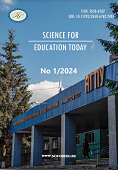Объективная оценка достигаемых образовательных результатов: особенности проектирования и применения оценочных средств в современных условиях цифрового развития
Objective assessment of learning outcomes: Peculiarities of design and application of assessment tools in modern conditions of digital development
Author(s): Vera Yurievna Abramova, Anna Kirillovna Veksler, Elena Nikolaevna Glubokova, Tatyana Stanislavovna Nazmutdinova, Regina Ivanovna Popova, Elvira Petrovna Chernyshova, Olga Andreevna Shelukhina, Inna Aleksandrovna KalabinaSubject(s): Education, School education, ICT Information and Communications Technologies, Sociology of Education, Pedagogy
Published by: Новосибирский государственный педагогический университет
Keywords: Learning outcomes; Competence assessment; Validity of assessment tools; Reliability of assessment tools; Design of assessment tools; Assessment tools banks;
Summary/Abstract: Introduction. The article deals with the problem of designing and application of assessment tools in the context of objective assessment of learning outcomes in higher education. The aim of the article is to identify the peculiarities of design and application of assessment tools in modern conditions of digital development for the objective assessment of learning outcomes. Materials and Methods. In order to achieve the purpose of the research, the authors used theoretical (analysis of theoretical sources) and empirical (survey of 222 teachers) methods. The data obtained were subjected to quantitative and qualitative analysis. Results. The authors analyzed the approaches to the interpretation of assessment procedures and means in theoretical studies and regulatory documents. The main results of the study allowed to identify a number of problems in the development of assessment tools banks: substitution of the subject of the assessment for the knowledge component; orientation to the development of assessment materials at the discipline level; assessment of the validity and reliability of the designed assessment tools; assessment of teachers’ labor input; the ratio of the used template assessment tools and practical tasks; difficulties in the design of interdisciplinary assessment tools and competence assessment in general; underestimation of the potential of digital environment in the development of assessment tools. Evaluating the problems of designing and applying assessment tools by teachers depended on the subject area they teach and their experience of participation in the development of assessment tools at various levels. The dependence on teachers’ professional experience and the position held has not been revealed. Conclusions. Based on the results of the study, conclusions about the types of problems in designing and application of assessment tools in modern conditions are drawn. Practical recommendations are provided.
Journal: Science for Education Today
- Issue Year: 14/2024
- Issue No: 1
- Page Range: 125-148
- Page Count: 24
- Language: Russian

